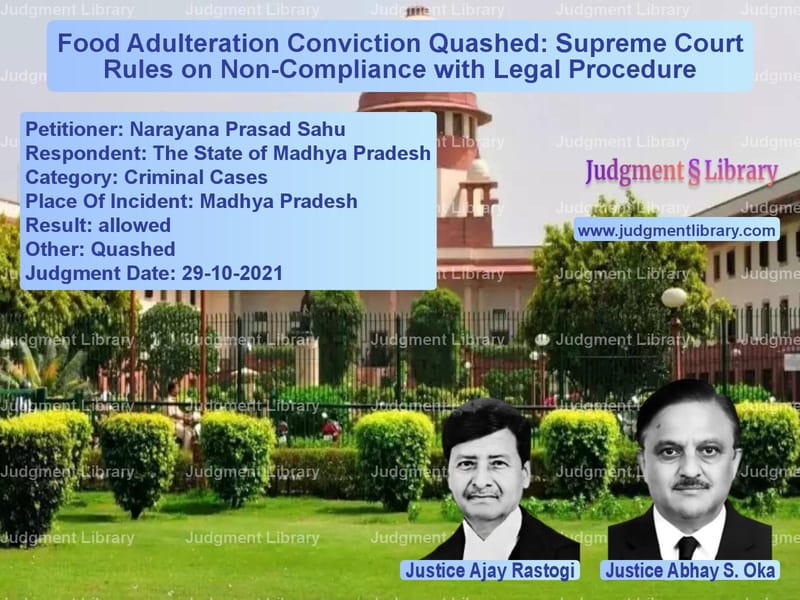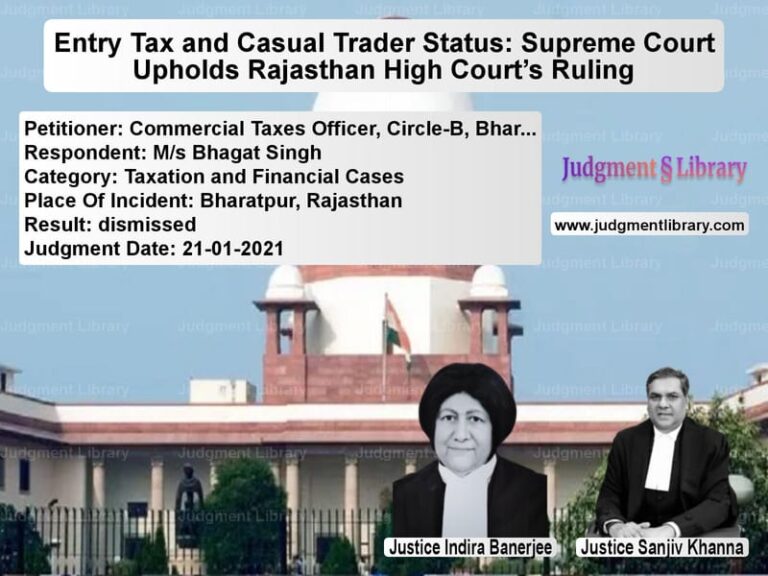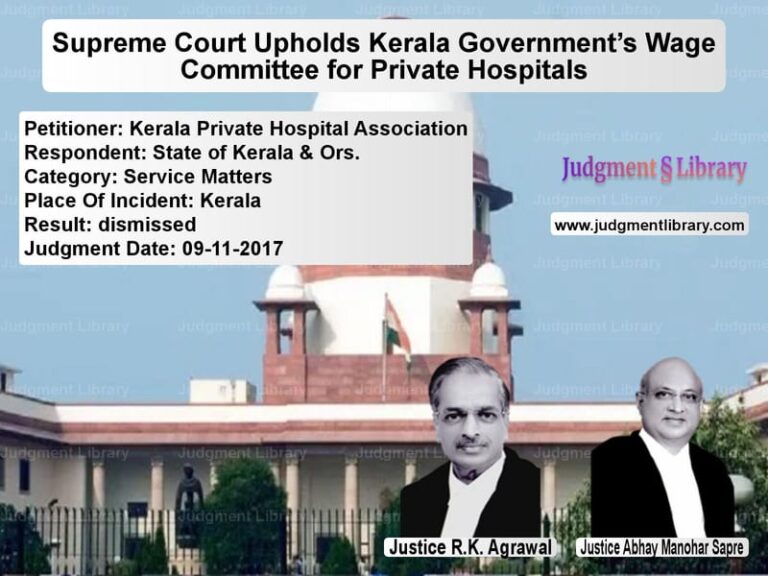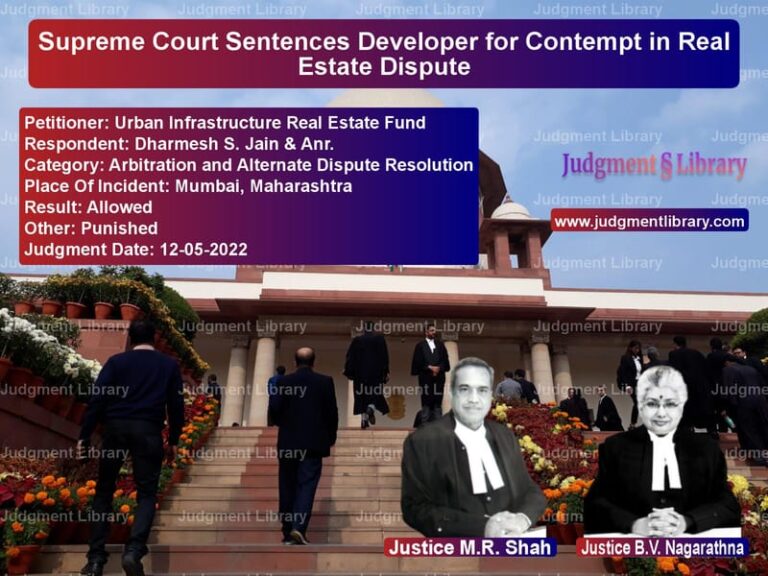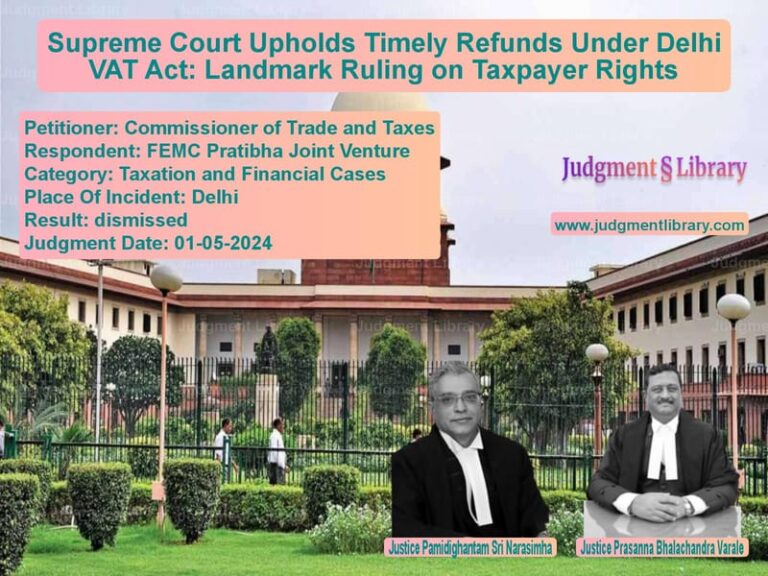Food Adulteration Conviction Quashed: Supreme Court Rules on Non-Compliance with Legal Procedure
The Supreme Court of India, in Narayana Prasad Sahu vs. The State of Madhya Pradesh, overturned the conviction of the appellant under the Prevention of Food Adulteration Act, 1954. The Court held that the prosecution had failed to comply with mandatory legal procedures, particularly the requirement to serve the report of the Public Analyst on the accused. This case highlights the importance of due process in food adulteration cases and sets a precedent for procedural compliance in criminal trials.
Background of the Case
The case dates back to January 16, 2002, when the appellant, Narayana Prasad Sahu, was selling chana daal at a weekly market in Kagpur, Madhya Pradesh. A Food Inspector conducted an inspection and found that the appellant did not possess a valid license. The Food Inspector then purchased 750 grams of chana daal as a sample and sent it for testing to a Public Analyst.
The report from the Public Analyst confirmed that the chana daal was adulterated. Based on this report, the appellant was prosecuted under Sections 7(i) and 7(v) read with Section 16(1)(a)(i)(ii) of the Prevention of Food Adulteration Act, 1954.
Read also: https://judgmentlibrary.com/bail-revoked-in-murder-case-supreme-court-cites-seriousness-of-crime/
Trial and Conviction
On October 12, 2007, the Judicial Magistrate First Class convicted the appellant, sentencing him to:
- Six months of rigorous imprisonment.
- A fine of Rs. 1,000.
- One additional month of rigorous imprisonment in case of default in fine payment.
The appellant appealed to the Sessions Court, which upheld the conviction. Subsequently, he filed a revision petition before the Madhya Pradesh High Court, which was also dismissed on May 3, 2018.
Key Legal Issue: Non-Compliance with Section 13(2)
The appellant challenged his conviction before the Supreme Court, arguing that the prosecution had failed to comply with Section 13(2) of the Prevention of Food Adulteration Act, 1954. This provision states:
“On receipt of the report of the result of the analysis under sub-section (1) to the effect that the article of food is adulterated, the Local (Health) Authority shall, after the institution of prosecution, forward a copy of the report to the accused, informing them that they may apply to the court within ten days to get the sample analyzed by the Central Food Laboratory.”
The appellant argued that he was never served with the Public Analyst’s report and was therefore denied his legal right to have the sample re-tested by the Central Food Laboratory.
Arguments Presented
Appellant’s (Narayana Prasad Sahu) Arguments:
- The mandatory requirement of serving the Public Analyst’s report was not fulfilled.
- Without receiving the report, he was deprived of his right to challenge its findings through a second analysis.
- The prosecution claimed to have sent the report via registered post, but the appellant never received it.
- The High Court erred in assuming that he had refused to accept the report.
Respondent’s (State of Madhya Pradesh) Arguments:
- The prosecution had sent the report via registered post as required by law.
- The postal endorsements indicated that multiple attempts were made to deliver the report.
- The High Court correctly inferred that the appellant refused to accept the report.
Supreme Court’s Ruling
The Supreme Court ruled in favor of the appellant, setting aside his conviction. The key findings were:
On Compliance with Section 13(2):
The Court held that merely dispatching the Public Analyst’s report does not satisfy the legal requirement. It must be served on the accused. The Court cited its earlier ruling in Vijendra vs. State of Uttar Pradesh (2020), which stated:
“Mere dispatch of the report to the accused is not sufficient compliance with Section 13(2). The report must be served on the accused, ensuring that they are informed of their right to request re-analysis.”
On the Burden of Proof:
The Court noted that the prosecution had relied on postal endorsements claiming that the appellant was not available to receive the report. However, the postman who allegedly made these endorsements was never examined in court. This created a serious gap in the prosecution’s case.
On the Right to Re-Testing:
The Court emphasized that the accused has a valuable right to seek an independent test from the Central Food Laboratory. If this right is denied due to procedural lapses, the conviction cannot stand.
Judgment and Impact
The Supreme Court allowed the appeal, quashing the conviction and sentence of the appellant. The key takeaways from the judgment include:
- The prosecution must ensure that the Public Analyst’s report is properly served on the accused.
- Failure to serve the report violates the accused’s right to defend themselves.
- Mere dispatch of the report does not fulfill the legal requirement.
- Courts should not infer service based on postal endorsements unless verified through witness testimony.
Conclusion
This judgment reinforces the importance of procedural compliance in food adulteration cases. By quashing the conviction, the Supreme Court has upheld the principle that accused individuals must be given every opportunity to defend themselves, especially when their liberty is at stake. This case serves as a precedent for ensuring strict adherence to procedural safeguards in criminal trials.
Petitioner Name: Narayana Prasad Sahu.Respondent Name: The State of Madhya Pradesh.Judgment By: Justice Ajay Rastogi, Justice Abhay S. Oka.Place Of Incident: Madhya Pradesh.Judgment Date: 29-10-2021.
Don’t miss out on the full details! Download the complete judgment in PDF format below and gain valuable insights instantly!
Download Judgment: narayana-prasad-sahu-vs-the-state-of-madhya-supreme-court-of-india-judgment-dated-29-10-2021.pdf
Directly Download Judgment: Directly download this Judgment
See all petitions in Legal Malpractice
See all petitions in Contempt Of Court cases
See all petitions in Fraud and Forgery
See all petitions in Judgment by Ajay Rastogi
See all petitions in Judgment by Abhay S. Oka
See all petitions in allowed
See all petitions in Quashed
See all petitions in supreme court of India judgments October 2021
See all petitions in 2021 judgments
See all posts in Criminal Cases Category
See all allowed petitions in Criminal Cases Category
See all Dismissed petitions in Criminal Cases Category
See all partially allowed petitions in Criminal Cases Category

